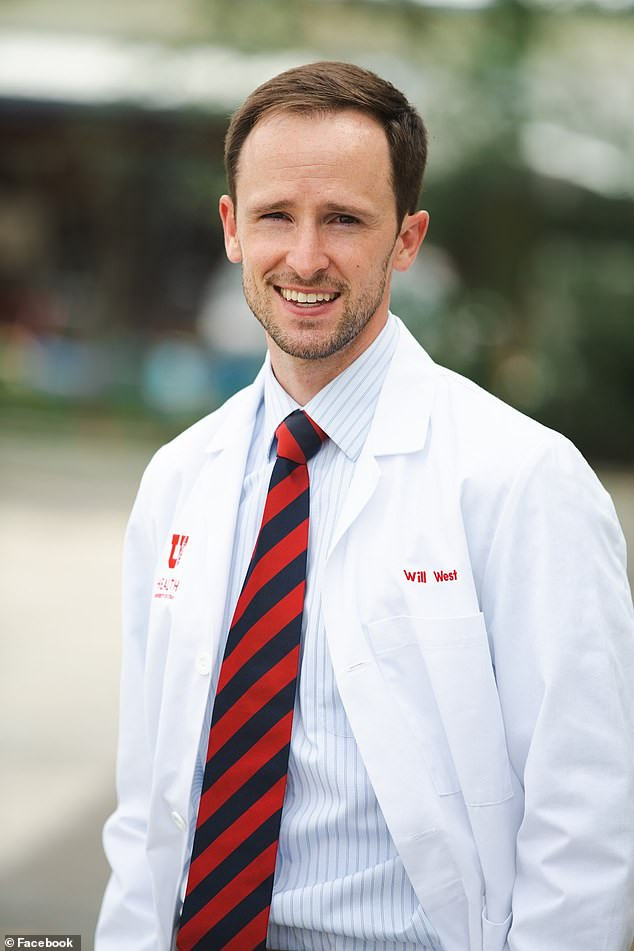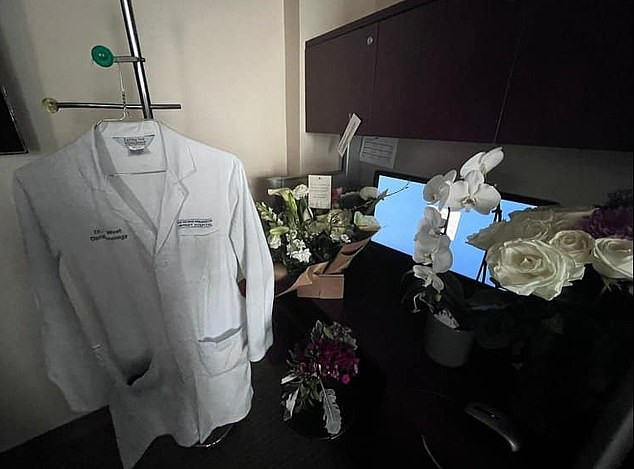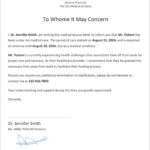The heartbreaking suicide of Dr. Will West, a 33-year-old ophthalmology resident at George Washington University School of Medicine and Health Sciences, has sent ripples of grief and concern throughout the medical community. His suicide note, revealing he had ‘run out of gas’, serves as a stark warning about the immense pressure and mental health challenges faced by medical professionals, particularly during residency.
Dr. West, known affectionately as ‘Iron Will’ for his unwavering determination, was in his third year of residency when he tragically took his own life. His passing has devastated not only his family and friends but also his colleagues at the Washington D.C. institution. In his poignant suicide note, obtained by the Washington Post, Dr. Will West articulated that his decision was not triggered by a singular event. Instead, he pointed to the overwhelming pressure of his residency, a demanding period of training that his family believes prevented him from seeking the help he needed.
 Dr Will West who took his own life left a heartbreaking suicide note saying he had
Dr Will West who took his own life left a heartbreaking suicide note saying he had
In his final message, Dr. Will West expressed deep regret for the pain his actions would cause. “To those who will be negatively affected by my actions, I’m so sorry. I have simply run out of gas and have nothing left to give,” he wrote. His words paint a picture of exhaustion and depletion, emphasizing the critical need for systemic changes within medical training programs. He further apologized for the abrupt nature of his departure, acknowledging the limitations in openly discussing such profound personal struggles in his profession, stating, “I apologize that this is the best I can do for goodbye. Many of you deserve better but one can’t exactly talk much about this kind of thing in advance so a note will have to do.”
In the days leading up to his suicide, Dr. West reached out to his brother, David, who is also pursuing medical studies. These conversations, in retrospect, appeared to be subtle farewells, as David explained his brother seemed to be checking on the well-being of his siblings. David West shed light on the grueling conditions of medical residency, characterized by work weeks often exceeding 80 hours with limited compensation. He emphasized that these conditions exact a heavy toll on the mental health of residents. Compounding this issue is the fear among medical professionals to voice their struggles due to concerns about potential damage to their career prospects. The requirement for doctors to disclose mental health treatment during job applications further exacerbates this fear and creates a barrier to seeking help.
Dr. Will West had previously been diagnosed with ADHD and depression and had sought treatment in Utah, his home state. However, he refrained from seeking support from the hospital in Washington D.C. due to apprehension about professional repercussions. David West poignantly described the culture within the medical field, stating, “Imperfection is not allowed. Weakness is not either. When it’s there, it’s treated with disdain instead of an opportunity for learning and growth.”
This culture of perceived intolerance towards vulnerability was echoed in Dr. Will West’s suicide note. He directly addressed those in positions of authority over residents, writing, “To those in a position of authority over residents, a simple reminder that we come to you seeking the possibility of a better life. Some of us with challenges you do not see or backgrounds of which you are not aware.” His words are a plea for empathy and understanding within the demanding environment of medical training. He urged those in leadership to prioritize support and mentorship over relentless assessment, hoping for “an effort can be made to understand, support, and mentor the residents rather than simply to assess and drive them toward their highest potential as doctors.”
Dr. West’s note also included a stark warning about the broader risks within his workplace. “To be clear, there are other people at real risk here at GW,” he stated, emphasizing the urgency of the situation. “There are other residents right now fighting a true life and death battle — one that is waged both inside and out at the clinic/hospital. Often that battle may cause symptoms that look an awful lot like laziness, lack of motivation or waste of intelligence, all unforgivable sins in our profession.” This powerful statement underscores the silent battles many medical residents face and the potentially devastating consequences of a system that may not adequately recognize or support their struggles.
The obituary for Dr. Will West poignantly described his death as ‘unimaginably heartbreaking’, celebrating his ‘fun spirit’ and ability to bring laughter. In lieu of flowers, the family requested donations to the Dr. Lorna Breene Heroes’ Foundation, an organization dedicated to supporting the mental health and wellbeing of medical workers.
 West
West
The Dr. Lorna Breene Heroes’ Foundation was established in memory of Dr. Lorna Breene, a fellow medic who also died by suicide after experiencing mental health challenges during the COVID-19 pandemic. Dr. Breene’s story, as shared by her brother-in-law, highlights the devastating fear that seeking mental health treatment could jeopardize a medical license. Stefanie Simmons, chief medical officer at the foundation, described this agonizing dilemma: “You are facing the decision of whether to put your future career, which is often your mission in life to care for others and use your talents to do that, at jeopardy by taking care of yourself in a way that you know you should be.”
In response to Dr. West’s death, George Washington University Hospital issued a statement affirming that the safety and well-being of its students and staff is their ‘highest priority’. They acknowledged the demanding nature of residency and the potential need for professional support, stating, “At GW, like other medical training programs, we recognize that the residency experience can be personally challenging and that residents may need professional support for their well-being.” The university also recognized the stigma surrounding mental health in the medical profession and claimed to be striving to eliminate it, adding, “The university is aware of and strives to eliminate the culturally entrenched stigma that has long interfered with physicians’ willingness to seek help with, at times, life-threatening mental conditions. The GW School of Medicine and Health Sciences (SMHS) offers resources to support the physical, emotional/mental health, and overall well-being of residents — including confidential counseling at no cost.”
However, in the aftermath of Dr. Will West’s suicide, his colleagues organized a rally three months later, advocating for a mental health stipend, improved working hours, and better compensation. Many residents expressed that they resonated with Dr. West’s struggles but had encountered obstacles in accessing mental health support within the hospital system. Despite the university’s claims of support, the empty desk adorned with floral tributes, once belonging to Dr. Will West, serves as a powerful and somber reminder of the urgent need for tangible change and accessible mental health resources for medical professionals.
If you or someone you know needs help, please call the National Suicide Prevention Lifeline at 988.

